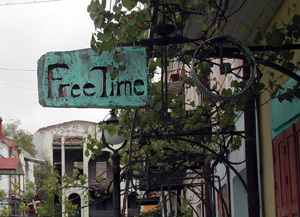Yesterday I happened to find one of the “Azg” newspaper’s 2002 editions. While I was drinking my morning coffee, I paged through the newspaper and took a look at the old article titles. The article on the last page of the edition told the story of how the Turkish government and some ministries were getting ready to fight against the possible showing of the film “Ararat” by Atom Egoyan. It was as if they were getting ready to fight against a terrible epidemic. As I read this article, I remembered reading another article recently about how a private Turkish television network was going to show the film. Thank God we have Internet. The search didn’t take long. As I entered the keyword “Atom Egoyan: Ararat”, I immediately found the news from the “Regnum” agency and I found out that the private “Canal Turk” television channel had shown the film on April 13th of this year. The press secretary of the network had stated that the channel had broadcasted the film based on the 72% votes of TV viewers and most importantly, the Turkish government had not prohibited broadcast.
So, the time slot between the news published in “Azg” and “Regnum” is four years. Four years is not really a long time for changing opinions among society, but it is a pretty long time compared to a person’s entire lifespan. It’s obvious that the Turkish society’s opinions couldn’t have changed within the course of four years. Thus, it’s also clear that the Turkish government was doing everything it could to hide the truth from the society. So, the past four years has really been lost time.
Now we have the member of the Turkish Democratic Party and MP of the Turkish parliament Sukru Elekdagh, who is suing the publishers of the “Blue book”, which gives a documentation of the Armenian Genocide. Elekdagh is demanding compensation for the “moral damage” caused by author of the forward Taner Achkam. Taner Achkam criticized the MP for his letter sent to Great Britain, in which he demands denying whatever’s written in the “Blue Book”. The “Blue Book”, written by Lord Brays and well-known historian Arnold Toinby, presents the report heard in the British parliament in 1916, which shows that the Armenian Genocide carried out by the Ottoman Turks was planned beforehand.
This, of course, is a little more serious than Atom Egoyan’s film, but I won’t be amazed to find out that in 2010 some news agency announces that the book has been republished and is being sold in all Turkish book stores with the demand of 72% of readers. We can add another four years to the lost time.
Recently, the Azerbaijani “Zerkalo” newspaper had demanded an explanation from head of the Karabagh Liberation Organization (KLO) Akif Naghi based on the fact that he had offended and lowered the reputation of chief editor of the newspaper and “Ayna” newspaper staff member Rauf Mirkadirov. What turned out from that long interview? It turns out that the “Zerkalo” and “Ayna” newspapers have brought out into the light all the initiatives taken by KLO for several years, including, the attacks on NATO with the participation of Armenian officers, the picket organized by the KLO at the Baku airport thanks to which Armenia didn’t take part in the NATO session, and the organization’s inglorious march towards Shushi.
Four angry journalists interviewed Akif Naghi with the purpose of turning the “national hero” into a “nobody” based on the reason that he has offended them. Based on the Azerbaijani journalists’ questions and the non-professional answers by Naghi, it becomes clear that Naghi has not participated in the Karabagh war, that he has intimate ties with the head of the Azerbaijani president’s administration and that the administration has directed him in his actions, that Naghi was the first to take the initiative of declaring Ramil Safarov a national hero, that he was the one who thought up the version of Safarov’s “hurt dignity” and he was the one responsible for the failure of the trying in the Budapest court.
Was the torch-bearer of the Karabagh liberation supposed to stomp on the fingers of journalists so they would understand how empty-headed his opinions sound and the damage he has caused with his actions? Was it really that hard to picture handing over the job of liberating the “lost homeland” to a criminal candidate of sciences, or realize that the march towards Shushi was based on propaganda motives? But for years, the editors and journalists of the abovementioned newspapers (they confess) have fed readers with the crazy initiatives taken by Naghi so that they can keep the “patriotism” alive in their souls. Now they understand that they simply wasted a lot of time. Later on they will realize that they are wasting their time by proving the improvable, that the cross-stones in Nakhijevan are Azerbaijani. Perhaps after four years the officer giving the order to eliminate the cross-stones will not even pay attention to any newspaper editor and perhaps the editor will then remind the officer about the maltreatment of the Armenian or Azerbaijani ( it doesn’t really matter in this case) cultural monuments.
What does all this have to do with us Armenians?-nothing at first sight. But there are some who talk about the incompatible genetics of Armenians and Azerbaijani without doubting the fact that peace and co-existence are inevitable. Some Armenians demand prohibiting Turkish products entering the Armenian market, without even doubting the fact that Armenia will then become more isolated, while Turkish economy will not really suffer. Some even want to solve the issues concerning Armenians in Javakhk as soon as possible and add more time to the already lost time by getting ahead of themselves.
We have a five thousand-year old history. What’s a little loss of time here and there going to do?

